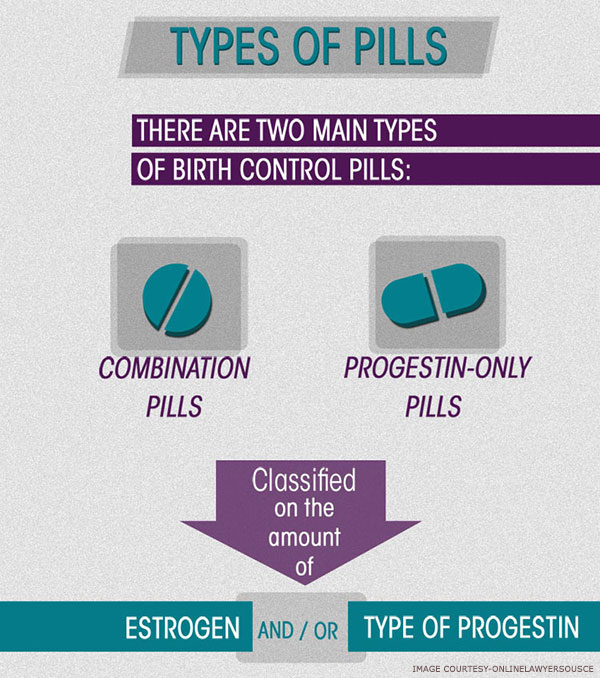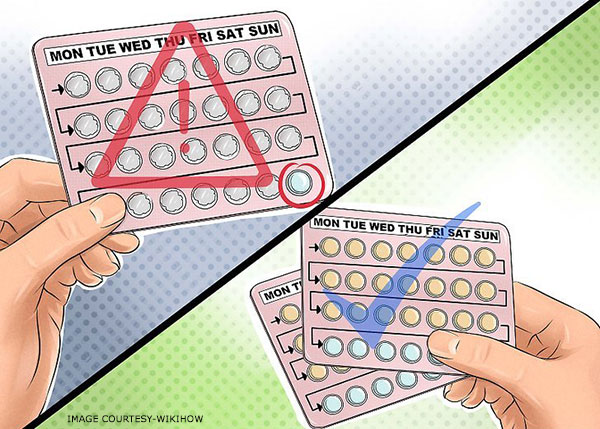There are many various birth control methods available for you to avoid or prevent pregnancy. Of all these, birth control pills or oral contraceptives are the most popular and most sought-after means of contraception around the world.
Birth control pills are artificial hormones taken by women orally. If prescribed and taken correctly, they can be almost 100% effective. Like any other contraception method, there are different types of birth control pills and side effects that come with them. To find out more about this method of contraception and its types, keep reading this article!
1. How Many Different Types Of Birth Control Pills Are There?

Essentially, there are only two major types of birth control pills, the combination pills, and the progestin-only or mini-pills. However, there are also various kinds of combination pills namely monophasic, multiphasic (biphasic and triphasic), extended-cycle, and low-dose pills.
2. What Are The Different Types Of Birth Control Pills?

More information about each type of birth control pills is listed below, along with facts about their effectiveness, how they work against pregnancy and the possible side effects.
3. Combination Birth Control Pills

Like the birth control patch and vaginal ring, combination pills contain two types of the synthetic or man-made hormones progestin and estrogen in different ratios.
Pregnancy is prevented by combination pills through three ways:
A. Preventing ovulation which means your ovaries do not release any eggs.
B. Increasing the thickness of cervical mucus to slow down or make it harder for sperm cells to swim towards the egg cell.
C. Making the lining of the uterus thinner to prevent or make it harder for the egg to adhere to it.
Other benefits associated with combination pills are shorter and lighter periods (which also reduces chances of anemia), less abdominal cramps, less acne, and reduced risk of endometrial and ovarian cancer.
Combination pills are the most popular and come in different hormone ratios that can change throughout the month or depending on the type. Combination pill brands include Enpresse, Azurette, Estrostep Fe, Beyaz, Levora, Loestrin, Kariva, Ocella, Natazia, Ortho-Novum, Low Ogestrel, Seasonale, Ortho-Tri-Cyclen, Yasmin, Velicent, Nordette, Mircette, Apri, Alesse, Aviane, Jolessa, Lybrel, Lessina, and Seasonique.
Pills are either active (contain hormones) or inactive (do not contain any hormones).
A. The two categories based on hormone dosage are monophasic or multiphasic.

i. Monophasic Pills
Monophasic pills contain only one phase or amount of progestin and estrogen every day all throughout the month, hence the name. Used in monthly cycles, women taking this type of pill takes inactive pills at the last week of their cycle to get their period.
ii. Multiphasic Pills
Multiphasic pills vary regarding the amounts of hormone and active ingredients. Different doses or levels of hormones apply depending on where you are in your menstrual cycle. These are also used in one-month cycles and again require inactive pills during the last week of the cycle to get your period. Multiphasic pills may either be biphasic or triphasic.
iii. Biphasic Birth Control Pills
Provide the same amount of estrogen for the first 21 days of the cycle but gives lower amounts of progestin during the first half and higher amounts of progestin in the second half of the cycle. The lower progestin/estrogen ratio during the first half causes the normal thickening of the uterine lining or endometrium. On the second half of the cycle, the higher progestin/estrogen ratio allows this lining to shed normally.
iv. Triphasic Birth Control Pills
Involve three doses or ratios of estrogen and progestin throughout the menstrual cycle.
As of now, there is no scientific evidence to prove whether monophasic pills are more effective than multiphasic pills or vice versa.
B. Other types of combination contraceptive pills are extended-cycle and low-dose pills.

v. Extended-Cycle Pills
Extended-cycle or continuous-dose pills are often used in 13-week cycles wherein 84 active pills are taken for the first 12 weeks then inactive pills are taken in the last week for you to have your period. As a result, you get fewer periods (about three to four) in a year.
vi. Low-Dose Pills
Less than 50 micrograms of estrogen, usually only 35 micrograms or even less are contained in each active low-dose pill. This is a great option for women who are just starting birth control to allow their bodies to adjust. However, while many women achieve high success rates of birth control with these pills, more breakthrough or mid-cycle bleeding is experienced.
vii. Mini Pills
Unlike combination pills, a mini-pill or progestin-only pill does not contain any estrogen on any day of the cycle. This makes this type a better choice for women who are sensitive to estrogen or have certain medical conditions. Many doctors also recommend this type since most birth control pills side effects are due to estrogen. It is also safe for women who are breastfeeding, smokers, are older than 35, have a history of blood clots, or at risk of strokes and heart disease. These may be considered as the best birth control pills with least side effects by some women.
Mini-pills contain the same dosage of progestin which is also lower than the progestin dosage of combination pills. There are no inactive mini pills, so periods are either present or absent. Pregnancy is prevented by thinning the uterine lining and thickening cervical mucus. Some mini pills also prevent ovulation. While combination pills are argued to be significantly more effective than mini-pills, but health or other reasons may leave some women with not much choice and scientific studies have shown that both have the same failure rate, about 1 in 10.
You may know mini pills by its many names including Errin, Jolivette, Camila, Heather, Jencycle, Ortho Micronor, or Nor-QD.
viii. Emergency Contraceptive Pill
The emergency contraceptives pill or also known as the morning-after pill may also be considered as a birth control pill but is more like an alternative. This is taken in the morning or about 120 hours or 5 days after unprotected sex to prevent pregnancy.
RELATED: Why My Birth Control Failed
4. Instructions And Warnings On How To Take Birth Control Pills

Ideally, you should take the pill at the same time every day for the whole duration of your cycle. When taken as directed, most types of birth control pills types of birth control pills have about 99% efficacy rate. However, many factors may cause you to forget taking your pills regularly. So, what do you do if you forget to take your pill?
Find the answer to this question and many others through these helpful tips:
If you happen to forget to take your pill for one day, you can safely take two the next day. However, doctors recommend using backup types of birth control method such as condoms just to be safe.
If you forgot to take your pill for two or more consecutive days, some medical advice suggest taking 2 active pills as soon as you can while some say you should take the most recent missed pill, discard the rest, and continue taking your pills at the same time every day. During this time, you should also use other means of birth control or refrain from having sex.
A. All types of birth control pills do not protect you from STDs like HIV. So, if you want to avoid this, you should explore other birth control options.
B. Use back-up birth control if you have diarrhea or vomiting as this can cause the pill to stop working.
C. Talk to your doctor about any medications or antibiotics that you are taking to prevent contraindications or side effects.
D. Take your first active combination pill within 5 days of your first period.
E. Most pills take effect after about 72 hours or 3 days after taking the first active pill.
F. Do not take combination pills if you smoke, have just given birth, are older than 35, are sensitive to estrogen or have conditions like ocular migraines and high blood pressure.
While advertised to be very effective, the different types of birth control pills may cause various side effects. To avoid this, make sure to take your pills as directed and tell your doctor about your medications, sensitivities, health conditions, and other concerns.
“Hope you find the post helpful and we are excited to hear what you think of it!”






